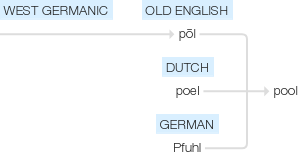Pool
Old English pōl, of West Germanic origin; related to Dutch poel and German Pfuhl .
wiktionary
From Middle English pool, pole, pol, from Old English pōl(“pool”), from Proto-Germanic *pōlaz(“pool, pond”), from Proto-Indo-European *bōlos(“bog, marsh”). Cognate with Scots puil(“pool”), Saterland Frisian Pol(“pool”), West Frisian poel(“pool”), Dutch poel(“pool”), Low German Pohl, Pul(“pool”), German Pfuhl(“quagmire, mudhole”), Danish pøl(“puddle”), Swedish pöl(“puddle, pool”), Icelandic pollur(“puddle”), Lithuanian bala(“bog, marsh, swamp, pool”), Latvian bala(“a muddly, treeless depression”), Russian боло́то(bolóto, “swamp, bog, marsh”).
From French poule(“collective stakes in a game”). The OED suggests that this may be a transferred use of poule(“hen”), which has been explained anecdotally as deriving from an old informal betting game in France - 'jeu de poule' - Game of Chicken (or Hen, literally) in which poule became synonymous with the combined money pot claimed by the winner.
etymonline
pool (n.1)
"small body of standing water," Old English pol "small body of water; deep, still place in a stream," from Proto-West Germanic *pōl- (source also of Old Frisian and Middle Low German pol, Dutch poel, Old High German pfuol, German Pfuhl "pool, puddle"), which is of uncertain origin, perhaps a substratum word [Boutkan]. As a short form of swimming pool it is recorded from 1901. Pool party "party at a swimming pool" is by 1965.
pool (n.2)
game similar to billiards, 1848, originally (1690s) the name of a card game played for collective stakes, from pool "collective stakes of players in a game," which is from French poule "stakes, booty, plunder," literally "hen," from Old French poille "hen, young fowl," from Vulgar Latin *pulla, fem. of Latin pullus "young animal," especially "young fowl," from PIE root *pau- (1) "few, little."
Perhaps the original notion is from jeu de la poule, supposedly a game in which people threw things at a chicken and the player who hit it, won it, which speaks volumes about life in the Middle Ages. The notion behind the word, then, is "playing for money." The connection of "hen" and "stakes" is also present in Spanish polla and Walloon paie.
By 1868 it came to mean "combination of a number of persons, each staking a sum of money on the success of a horse in a race, a contest in a game, etc., the money to be divided among the successful bettors," thus also "collective stakes" in betting. The sense of "common reservoir of resources" is from 1917. Meaning "group of persons who share duties or skills" (typist pool, etc.) is from 1928. From 1933 as short for football pool in wagering.
Pool shark is from 1898. The phrase dirty pool "underhanded or unsportsmanlike conduct," especially in politics (1951), seems to belong here now, but the phrase dirty pool of politics, with an image of pool (n.1) is recorded from 1871 and was in use early 20c.
pool (v.1)
of liquid, "to form a pool or pools," 1620s, from pool (n.1). Earlier, of land, "to be full of pools" (polen, mid-15c.). Related: Pooled; pooling.
pool (v.2)
"to make a common interest or fund, put things into one common fund or stock for the purpose of dividing or redistribution in certain proportions," 1871, from pool (n.2). Related: Pooled; pooling.
